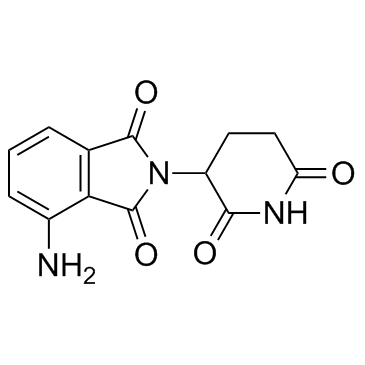Targeting of BMI-1 with PTC-209 shows potent anti-myeloma activity and impairs the tumour microenvironment.
Arnold Bolomsky, Karin Schlangen, Wolfgang Schreiner, Niklas Zojer, Heinz Ludwig
Index: J. Hematol. Oncol. 9 , 17, (2016)
Full Text: HTML
Abstract
The polycomb complex protein BMI-1 (BMI-1) is a putative oncogene reported to be overexpressed in multiple myeloma (MM). Silencing of BMI-1 was shown to impair the growth and survival of MM cells. However, therapeutic agents specifically targeting BMI-1 were not available so far. Here, we investigated PTC-209, a novel small molecule inhibitor of BMI-1, for its activity in MM.BMI-1 expression was analysed in human MM cell lines and primary MM cells by using publically available gene expression profiling (GEP) data. The anti-MM activity of PTC-209 was investigated by viability testing, cell cycle analysis, annexin V and 7-AAD staining, quantification of cleaved poly(ADP-ribose) polymerase (PARP), JC-1 as well as colony formation assays. Deregulation of central myeloma growth and survival genes was studied by quantitative PCR and flow cytometry, respectively. In addition, the impact of PTC-209 on in vitro osteoclast, osteoblast and tube formation was analysed.We confirmed overexpression of BMI-1 in MM patients by using publically available GEP datasets. Of note, BMI-1 expression was further increased at relapse which translated into significantly shorter overall survival in relapsed/refractory patients treated with bortezomib or dexamethasone. Treatment with PTC-209 significantly decreased viable cell numbers in human MM cell lines, induced a G1 cell cycle arrest, promoted apoptosis and demonstrated synergistic activity with pomalidomide and carfilzomib. The anti-MM activity of PTC-209 was accompanied by a significant decrease of cyclin D1 (CCND1) and v-myc avian myelocytomatosis viral oncogene homolog (MYC) expression as well as upregulation of cyclin-dependent kinase inhibitor 1A (CDKN1A) and cyclin-dependent kinase inhibitor 1B (CDKN1B). We also observed upregulation of NOXA (up to 3.6 ± 1.2-fold induction, P = 0.009) and subsequent downregulation of myeloid cell leukemia 1 (MCL-1) protein levels, which likely mediates the apoptotic effects of PTC-209. Importantly, the anti-MM activity was upheld in the presence of stromal support or myeloma growth factors insulin-like growth factor 1 (IGF-1) and interleukin 6 (IL-6). In the MM microenvironment, PTC-209 impaired tube formation, impaired osteoclast development and decreased osteoblast formation in a dose-dependent manner (P < 0.01 at 1 μM, respectively). The latter might be attributed to an induction of DKK1 and was reversed by concurrent anti-DKK1 antibody treatment.We confirmed overexpression of BMI-1 in MM highlighting its role as an attractive drug target and reveal therapeutic targeting of BMI-1 by PTC-209 as a promising novel therapeutic intervention for MM.
Related Compounds
| Structure | Name/CAS No. | Molecular Formula | Articles |
|---|---|---|---|
 |
TRAP-14 trifluoroacetate salt
CAS:137339-65-2 |
C81H118N20O23 | |
 |
Pomalidomide
CAS:19171-19-8 |
C13H11N3O4 |
|
Soluble expression and purification of receptor activator of...
2015-02-01 [J. Microbiol. Biotechnol. 25(2) , 274-9, (2015)] |
|
The biocompatibility of degradable magnesium interference sc...
2015-01-01 [Biomed Res. Int. 2015 , 943603, (2015)] |
|
CCR5 receptor antagonists block metastasis to bone of v-Src ...
2014-12-01 [Cancer Res. 74(23) , 7103-14, (2014)] |
|
Bleeding diathesis and gastro-duodenal ulcers in inherited c...
2014-12-01 [Thromb. Haemost. 112(6) , 1182-9, (2014)] |
|
Pasteurella multocida toxin- induced osteoclastogenesis requ...
2015-01-01 [Cell Commun. Signal. 13 , 40, (2015)] |